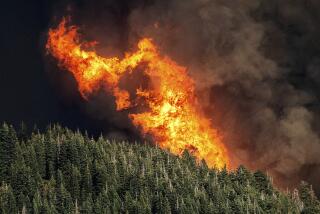Plant a Tree, for Doomsday Will Soon Be Upon Us
- Share via
The other day I answered the doorbell to find two women members of Jehovah’s Witnesses on my porch. They were elderly kindly and seemed concerned only for my soul.
I assured them that I was beyond redemption and that if the world did indeed come to an end, I could not hope to be among the chosen few who would ascend to heaven.
More in pity than in anger, they walked backward down the steps, shaking their heads at my intransigence.
But their visit had its effect. It reminded me that it had been some time since I had checked my Doomsday file. This is a file of clippings I keep on the subject of the end of the world and how it will probably come about, whether by fire or by ice.
In going through it, I found that even in very recent years, the scenario has kept changing. As scientists make new discoveries about the cosmos and the history of our tiny planet, they keep rewriting the last act.
Ironically, the idea that the world would end in nuclear fusion, or in the nuclear winter to follow, has lost probability with the end of the Cold War and the easing of tension between democracy and communism.
For 40 years it seemed probable that we would blow ourselves up, thus denying the inevitable natural forces their part in the game. Though diminished, that threat has not gone. As long as there are stockpiles of nuclear bombs, the danger remains. Any nut might get hold of one. One 2-megaton nuclear warhead has the explosive equivalence of all the bombs exploded in World War II.
At least one religious group in Montana is not reassured. That is the Church Universal and Triumphant, whose leader has predicted a nuclear war sometime this month and decreed that the church’s people should go underground. This prospect does not appeal to its teen-agers, several of whom have rebelled.
Cockeyed as this defensive strategy may seem to us more sensible folk, let us remember that not long ago our own political leaders were advocating it with a straight face. T.K. Jones, President Reagan’s deputy undersecretary of defense, told us: “Dig a hole, cover it with a couple of doors and then throw three feet of dirt on top. . . . If there are enough shovels to go around, everybody’s going to make it.”
Just recently, scientists concluded that periodically through the Earth’s history, almost all life has been destroyed by the effects of an asteroid striking Earth. A large asteroid falling into the sea would generate enough steam to boil everyone on Earth alive, like so many lobsters. That may be what happened to the dinosaurs.
In Charles Panati’s “Extraordinary Endings of Practically Everything and Everybody” (Harper & Row), he says that at least 99% of all species that ever lived on Earth are extinct. He observes that mass catastrophes have occurred about every 30 million years. The last big one was the Cretaceous Extinction of 65 million years ago, which exterminated the dinosaurs (which did not coexist with man).
In the Pleistocene Extinction, only 10,000 years ago, about 50% of animal species disappeared worldwide; in the Americas, about 67%. Keeping in mind that these catastrophes occur about every 30 million years, it seems to me we ought to keep an asteroid watch, rather than worry about the Russians.
We have been hearing for years that the greenhouse effect, in which the cloud of carbon dioxide produced by humans is causing the climate to warm, will inevitably melt the icecaps and flood coastal cities, causing all sorts of havoc otherwise.
But the latest findings of meteorologists is that the climate is not warming; they warn, however, that we must still suppress our output of carbon dioxide.
All these dangers may seem far in the future (although that periodic catastrophe may be imminent), but the environmentalists are right. We must take steps now to save our planet. Any day now it may be too late.
Sooner or later we’ll have to give up our automobiles, quit chopping down our rain forests, practice birth control, quit burning fossil fuels and quit using up our resources for consumer goods.
Meanwhile, why don’t we concentrate our technological skills on how to divert an asteroid that’s headed toward us, instead of spending ourselves into bankruptcy on Star Wars?
And why doesn’t everybody plant a tree?
More to Read
Sign up for Essential California
The most important California stories and recommendations in your inbox every morning.
You may occasionally receive promotional content from the Los Angeles Times.













